Are you looking to keep your epoxy resin floor in top condition?
Regular cleaning is key to maintaining its beauty and durability.
We explore the benefits of cleaning epoxy resin floors, the tools needed for the job, and step-by-step instructions on how to clean and maintain your floor.
We also discuss common mistakes to avoid to ensure your floor stays looking its best.
Learn how to keep your epoxy resin floor sparkling clean!
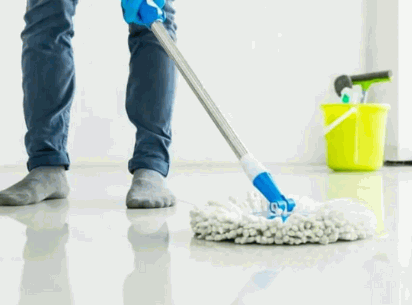
What Is An Epoxy Resin Floor?
An epoxy resin floor is a type of flooring surface that is created by mixing together resin and hardeners to form a tough, durable, and chemically resistant surface.
Known for its outstanding durability, an epoxy resin floor is able to withstand heavy foot traffic, impacts, and chemical spills without deteriorating. It is commonly used in industrial settings, commercial spaces, garages, and even residential areas where a hard-wearing and seamless surface is required. The application process involves pouring the epoxy mixture onto the prepared floor surface, which then cures to create a smooth and glossy finish.
Uncover more: Can You Put Resin On Wood Flooring

Why Is Cleaning Epoxy Resin Floor Important?
Cleaning epoxy resin floors is essential to maintain their durability, appearance, and resistance to stains and chemicals over time.
Regular cleaning and maintenance play a crucial role in extending the lifespan of epoxy floors, ensuring they remain visually appealing and safe. By removing dirt, debris, and potentially harmful substances promptly, you can prevent them from causing damage to the flooring. Utilizing appropriate cleaning tools specifically designed for epoxy floors can make the cleaning process efficient and effective.
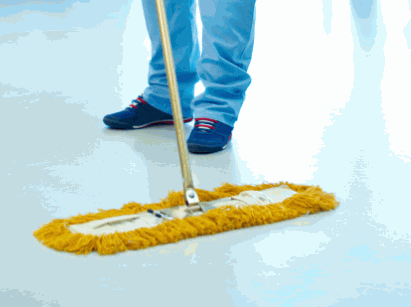
What Are The Benefits Of Regular Cleaning?
Regular cleaning of epoxy resin floors offers numerous benefits such as prolonging the floor’s lifespan, maintaining its appearance, and effectively removing tough stains and dirt buildup.
Adhering to a routine maintenance schedule is essential for ensuring that your floor remains in pristine condition. By performing deep cleaning regularly, you not only preserve the integrity of the flooring material but also prevent the accumulation of grime that can lead to deterioration over time. This proactive approach not only safeguards the longevity of the surface but also contributes significantly to maintaining a hygienic environment by eliminating dirt, germs, and allergens that may be lurking within the floor’s crevices.

What Are The Tools Needed For Cleaning Epoxy Resin Floor?
To clean epoxy resin floors effectively, you will require specific tools such as a soft-bristled broom, a microfiber mop, a suitable degreaser, and potentially a floor scrubber for more extensive cleaning.
These tools play crucial roles in maintaining the cleanliness and appearance of epoxy floors. The soft-bristled broom is ideal for daily sweeping, removing dust, dirt, and debris without scratching the floor’s surface. A microfiber mop is excellent for regular mopping, as it effectively captures dirt and grime, leaving the floor sparkling clean. When dealing with tougher stains and grease build-up, a suitable degreaser comes in handy, breaking down and removing stubborn residues effectively. For deep cleaning and tackling stubborn grime, a floor scrubber provides a more robust solution, ensuring thorough cleanliness and a polished finish.
To clean epoxy resin floors effectively, you will require specific tools such as a soft-bristled broom, a microfiber mop, a suitable degreaser, and potentially a floor scrubber for more extensive cleaning.
These tools play crucial roles in maintaining the cleanliness and appearance of epoxy floors. The soft-bristled broom is ideal for daily sweeping, removing dust, dirt, and debris without scratching the floor’s surface. A microfiber mop is excellent for regular mopping, as it effectively captures dirt and grime, leaving the floor sparkling clean. When dealing with tougher stains and grease build-up, a suitable degreaser comes in handy, breaking down and removing stubborn residues effectively. For deep cleaning and tackling stubborn grime, a floor scrubber provides a more robust solution, ensuring thorough cleanliness and a polished finish.
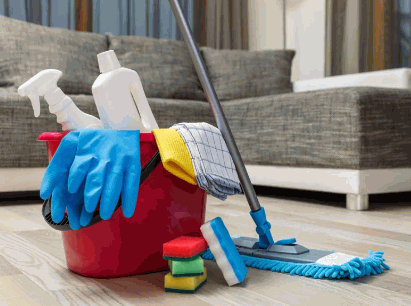
How To Clean Epoxy Resin Floor?
Cleaning an epoxy resin floor involves several steps starting with sweeping or vacuuming, preparing a cleaning solution using diluted ammonia or vinegar, mopping the floor, rinsing, and finally, drying the surface thoroughly.
Once you have gathered your supplies, begin by swiftly sweeping or vacuuming the surface to remove any loose debris that could scratch the floor during cleaning. Dilute the cleaning solution by mixing a small amount of ammonia or vinegar with warm water in a bucket. Be sure to follow the recommended ratios to avoid damaging the floor coatings.
Next, dip a mop into the solution and wring it out before thoroughly mopping the entire floor. Make sure to pay extra attention to any stubborn stains or areas that may have accumulated dirt.
After mopping, rinse the floor with clean water to remove any residue from the cleaning solution, ensuring no chemicals are left behind.
Step 1: Sweep Or Vacuum The Floor
The initial step in cleaning an epoxy resin floor involves sweeping or vacuuming the surface to remove loose dirt and debris using a dust mop or a shop vacuum.
Keeping the surface clean is crucial as dirt and debris can scratch the epoxy finish over time, diminishing its aesthetic appeal and durability. By using a dust mop or shop vacuum, you ensure that no particles are left behind, preventing potential damage to the floor. These tools not only aid in maintaining the floor’s appearance but also contribute to its longevity, saving you time and money on repairs in the long run. Investing time in this first step sets the foundation for a successful and efficient cleaning process.
Step 2: Prepare A Cleaning Solution
The next step is to prepare a suitable cleaning solution for epoxy floors, which can be achieved by diluting ammonia or vinegar in water to create an effective and safe solution.
When using ammonia, it’s important to remember to dilute it properly to avoid any damage to the epoxy surface. Ammonia is a powerful cleaner that can effectively cut through grease and grime, making it ideal for stubborn stains.
On the other hand, vinegar, a more gentle option, is great for regular cleaning and can help eliminate odors.
Both ammonia and vinegar have antibacterial properties, ensuring that your epoxy floors not only look clean but are also free from harmful germs. By incorporating these natural ingredients into your cleaning routine, you can maintain the beauty and longevity of your epoxy floors with ease.
Step 3: Mop The Floor
After preparing the cleaning solution, proceed to mop the epoxy resin floor using a mop soaked in the solution, focusing on areas with tough stains or tire marks that may require extra attention.
When dealing with tire marks on the surface, apply slightly more pressure while mopping to lift the stubborn residue. It’s important to move the mop in back-and-forth motions rather than in circles to effectively target the affected areas.
For deep-seated stains, consider using a lactic acid-based cleaner as it is specially formulated to break down tough grime without damaging the epoxy floor.
Ensure that the entire floor surface is covered evenly with the cleaning solution to achieve consistent results across the area. Pay close attention to corners and edges, as these areas tend to collect dirt and require thorough cleaning.
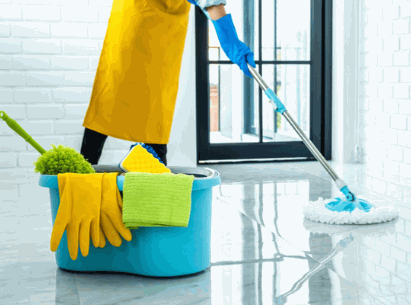
Step 4: Rinse The Floor
Once the floor has been mopped, rinse it thoroughly with clean water to remove any residue from the cleaning agent solution and ensure no chemicals or soapy residue are left on the surface.
After mopping, the rinsing process acts as a crucial step to guarantee a truly clean and safe environment. Rinsing not only eliminates any lingering traces of cleaning agents, which could be harmful if left behind but also helps in maintaining the appearance and lifespan of your flooring.
Step 5: Dry The Floor
After rinsing, dry the epoxy resin floor thoroughly using a clean, dry mop or towels to prevent water spots and maintain the floor’s cleanliness and appearance.
Properly drying the floor is crucial in completing the cleaning process effectively. Not only does it prevent water spots, but it also ensures that the floor maintains its pristine condition. To achieve a spotless finish, gently run the mop or towels across the surface, making sure to reach all corners and edges.
This step is not just about aesthetics; it plays a significant role in the maintenance of the floor. Failure to dry properly can lead to moisture retention, which may damage the floor coatings over time, compromising the durability and longevity of the surface.
What Are The Tips To Maintain Epoxy Resin Floor?
To maintain an epoxy resin floor effectively, it is essential to clean spills immediately, use soft bristle brooms or microfiber mops, avoid harsh chemicals, regularly inspect the floor, and apply a protective coating every few years.
Pro tips for maintaining an epoxy floor involve being proactive in its care. By promptly addressing any spills or stains, you prevent them from seeping into the floor and causing damage.
While cleaning, opt for gentle methods using soft bristle brooms or microfiber mops to prevent scratches. Harsh chemicals can deteriorate the epoxy, so stick to milder cleaning products to preserve the floor’s integrity.
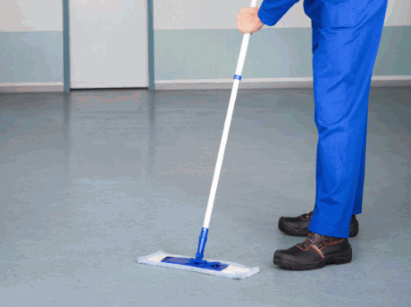
Clean Spills Immediately
One crucial tip for maintaining epoxy resin floors is to clean spills immediately to prevent stains, rust, or damage to the floor surface, ensuring longevity and aesthetic appeal.
Regular and prompt spill cleanup not only safeguards the floor’s appearance but also plays a significant role in preserving its structural integrity. When spills are left unattended, they can seep into the floor, causing deep-set stains that are challenging to remove. Liquid spills left for extended periods can lead to rust formation, which can weaken the floor over time. By incorporating spill cleanup as part of your routine maintenance routine, you can protect your epoxy resin floor from potential damage and maintain its pristine condition for years to come.
Use A Soft Bristle Broom Or Microfiber Mop
When cleaning epoxy resin floors, opt for soft bristle brooms or microfiber mops to avoid scratches or scuffs on the surface, ensuring gentle yet effective cleaning.
Using harsh cleaning tools like abrasive brushes or metal scrapers can cause irreversible damage to the epoxy surface, leading to a dull and worn-out appearance.
Regular maintenance with the right cleaning tools not only preserves the aesthetic appeal of the floor but also extends its lifespan, saving you from costly repairs in the long run.

Avoid Harsh Chemicals
To protect the integrity of epoxy resin floors, it is crucial to avoid harsh chemicals like bleach that can damage the surface, opting for gentle cleaning techniques to preserve the floor’s quality.
While bleach may seem like a powerful cleaning agent, its corrosive properties can lead to unwanted effects on epoxy floors. The chemical damage caused by harsh cleaners can result in discoloration, peeling, or even weakening of the epoxy surface over time.
Instead, consider using vinegar diluted in water as a safer alternative for cleaning epoxy floors. A mixture of mild detergent and warm water can effectively remove dirt and grime without jeopardizing the floor’s finish.
Regularly Inspect The Floor For Damage
Regular inspections of epoxy resin floors are essential to identify any signs of damage, delamination, or wear, allowing for timely maintenance and preservation of the floor’s condition.
Delamination, a common issue in epoxy floors, occurs when the layers separate, leading to structural weakness and safety hazards. By conducting thorough inspections, early signs of delamination can be detected before they escalate.
Proactive maintenance following inspections, such as repairs and protective coatings, is crucial to prevent extensive damage and increase the longevity of the flooring. Neglecting maintenance can result in costly repairs and potential safety risks for occupants.
Regular inspections are not only about identifying problems but also about ensuring a safe and visually appealing environment. Periodic floor inspections play a vital role in maintaining the functionality and aesthetics of epoxy resin floors over time.
Apply A Protective Coating Every Few Years
One maintenance tip for epoxy resin floors is to apply a protective coating every few years to enhance the surface’s durability, maintain its seamless finish, and protect against wear and tear.
Regular application of protective coatings not only acts as a shield against scratches and stains but also prevents chemical damage and extends the lifespan of the floor coating.
By forming a barrier between the underlying surface and daily wear, these coatings ensure that your seamless epoxy floor retains its gloss and smooth texture over time. Protective coatings make cleaning and maintenance routines easier, as dirt and spills are less likely to penetrate the treated surface, thereby saving both time and effort in the long run.
What Are The Common Mistakes To Avoid When Cleaning Epoxy Resin Floor?
When cleaning epoxy resin floors, it is crucial to avoid common mistakes like using abrasive cleaning tools, leaving standing water, using harsh chemicals, and neglecting regular cleaning routines.
Using abrasive cleaning tools on epoxy floors can lead to scratches and damages, compromising the smooth surface and overall appearance of the floor. Leaving standing water on these floors can cause discoloration and weaken the epoxy bond over time, resulting in potential peeling or flaking. Harsh chemicals may react negatively with the epoxy, causing stains or even deterioration of the flooring material. Neglecting regular cleaning routines can allow dirt and debris to accumulate, making it harder to maintain the cleanliness and integrity of the floor.
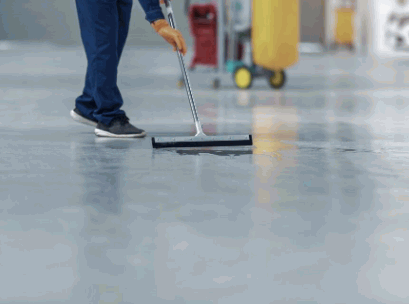
Using Abrasive Cleaning Tools
One common mistake to avoid when cleaning epoxy resin floors is using abrasive tools like steel wool, as they can scratch and damage the surface, compromising its appearance and durability.
Abrasive cleaning tools, such as steel wool, pose significant risks to the longevity of epoxy floors. The harsh nature of these tools can create scratches and abrasions on the surface, not only affecting the visual appeal but also weakening the overall structural integrity.
It’s crucial to opt for gentle cleaning methods that effectively remove dirt and grime without causing harm to the epoxy floor. Utilizing soft microfiber cloths or mop with a mild cleaning solution can help maintain the pristine condition of the floor without risking any damage.
Leaving Standing Water On The Floor
Leaving standing water on epoxy resin floors can lead to water spots, chemical damage, and potential issues with the floor’s integrity, emphasizing the importance of thorough drying post-cleaning.
When water lingers on an epoxy floor, it can not only leave unsightly marks but also infiltrate the surface, causing chemical reactions that weaken the material. The longer the standing water sits, the higher the likelihood of damage that may compromise the structural integrity of the floor. Inadequate drying after utilizing pressure wash or cleaning can result in irreversible harm, affecting both the appearance and functionality of the flooring. Proper maintenance routines, including prompt and thorough drying methods, are essential to prevent these risks and ensure the longevity of epoxy surfaces.
Using Harsh Chemicals
Another mistake to avoid is using harsh chemicals like ammonia or citrus cleaners on epoxy resin floors, as they can strip away the protective coating and damage the surface over time.
Epoxy floors are known for their durability and sleek appearance, but their maintenance requires specific care to preserve their longevity. Utilizing the wrong cleaning agent can result in irreversible harm, affecting not only the aesthetics but also the structural integrity of the floor.
Instead of resorting to aggressive chemicals, opt for gentle cleaners that are formulated for use on epoxy surfaces. These alternatives are designed to effectively clean without compromising the protective layer. By choosing the right cleaning solutions, you can ensure that your epoxy floors remain in pristine condition for years to come.
Neglecting Regular Cleaning
Neglecting regular cleaning routines for epoxy resin floors can result in dirt buildup, stains, and the need for more intensive cleaning solutions, underscoring the importance of consistent maintenance.
Without regular cleaning, dirt and grime can accumulate on the epoxy floor, compromising its cleanliness and hygiene. Over time, these deposits can lead to unsightly stains that are challenging to remove without the use of specialized cleaning products. Along with affecting the appearance of the floor, neglecting regular cleaning can also impact its durability and longevity.
Deep cleaning becomes imperative to restore the floor’s original luster and maintain its structural integrity. By ignoring routine maintenance, the need for deep cleaning sessions can become more frequent and labor-intensive, potentially resulting in higher maintenance costs and inconvenience to the occupants. Therefore, prioritizing regular cleaning is essential to preserve the aesthetics and functionality of epoxy resin floors.
